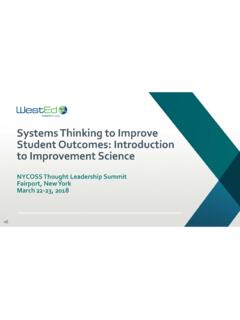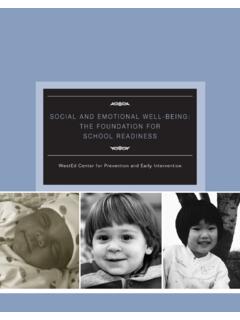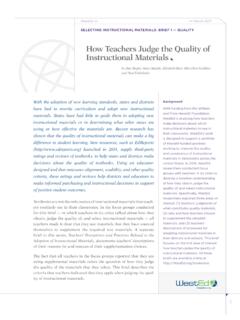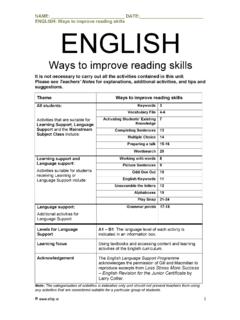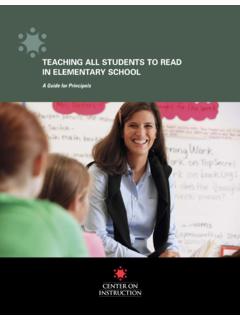Transcription of Developing Foundational Reading Skills in the Early Grades
1 PAMELA SPYCHER, WestEdJANUARY 2017 WITHD eveloping Foundational Reading Skills in the Early GradesTeaching Decoding Skills Through Small-Group Lessons About WestEdWestEd is a nonpartisan, nonprofit research, development, and service agency that partners with education and other communities throughout the United States to promote excellence, achieve equity, and improve learning for children, youth, and adults. WestEd has more than a dozen offices nationwide, from Massachusetts, Vermont, and Georgia, to Illinois, Arizona, and California, with headquarters in San Francisco. For more information, visit 2017 WestEd. All rights for permission to reproduce any part of this report should be directed to WestEd Publications Center, 730 Harrison Street, San Francisco, CA 94107-1242, 888-293-7833, fax 415-512-2024, or citation: Spycher, P. (2017). Developing Foundational Reading Skills in the Early Grades : Teaching decoding Skills through small-group lessons.
2 San Francisco, CA: with Learning ..vIntroduction ..1 Reading : The Bigger Picture ..1 Organization ..2 The California ELA/ELD Framework: Guidance on Teaching Foundational Reading Reading Skills : Developing Independence with the Code ..4 Learning Tasks Designed to Develop Foundational Reading Skills ..6 Not One-Size-Fits-All: Tailoring Instruction of Foundational Reading Skills ..7 Scaffolding for English Learners ..8 Classroom Vignette: Teaching Foundational Reading Skills in Kindergarten ..11 Background: Mr. Khang s Kindergarten Classroom ..11 Establishing Independent Learning Centers ..12 Small-Group Reading Table ..13 Assessment and Planning ..15 Sample Lesson: Teaching Decodable Reading Skills in Small Groups ..17 Teacher reflection and next steps ..21 Appendix A. Routine for Small-Group Decodable Reading B. Small-Group Decodable Reading Planning Template.
3 24 Appendix C. Phonics and Word Recognition Terms ..25 Appendix D. California Common Core State Standards: Reading Standards for Foundational Skills K 5 ..28 Appendix E. California English Language Development Standards: Foundational Literacy Skills Considerations for English Learners in Transitional Kindergarten through First Grade ..30 References ..32 ContentsLEADING WITH LEARNING ivList of FiguresFigure 1. California English Language Arts/English Language Development Framework: Circles of Implementation ..3 Figure 2. Learning Tasks to Support the Development of Foundational Reading Skills ..6 Figure 3. Framing Questions for Planning Decodable Reading Lessons ..17 Figure 4. Routine for Small-Group Decodable Reading Instruction ..18 Figure B1. Small-Group Decodable Reading Planning Template ..24 Figure C1: Phonics and Word Recognition Terms ..25 Figure D1.
4 California Common Core State Standards: Reading Standards for Foundational Skills K 5 ..28 Figure E1. California English Language Development Standards: Foundational Literacy Skills Considerations for English Learners in Transitional Kindergarten through First Grade ..30vLeading with LearningLeading with Learning provides districts with systemic support focused on improving teaching and learning for all students, particularly English with Learning: Blended Professional Learning for Cultivating Language and Literacy Development, Collaboration, and Equity (Leading with Learning) is a multi-strand model that involves intensive blended professional learning for teachers, instructional coaches, and principals in elementary and secondary schools, as well as systems-level support for district leaders. The goal of Leading with Learning is to raise student achievement and ensure that all students particularly English learners and other culturally and linguistically diverse students graduate from high school ready for college, careers, and meaningful interaction with civic accomplish this, Leading with Learning staff provide professional learning and systems-level assistance focused on strengthening teaching and leading in four big areas of classroom advocacy for English Essential PracticesCulturally and Linguistically Sustaining TeachingSca olding and Student OwnershipAcademic Language DevelopmentCollaborative Discussions, Reading , and Writing1 IntroductionThe ability to read is among our greatest accomplishments and enjoyments, and being able to understand and engage with a range of text types is critical to success in our ever-changing society.
5 Helping young children crack the code and become independent readers who love to read is one of the most import-ant roles of a teacher in the Early years of schooling. To enable children to become proficient readers, teachers must lay the groundwork for students Foundational Reading Skills , including teaching them the essential skill of decoding written words. This paper discusses the instruction and development of Foundational Reading Skills , with a particular focus on how to help students learn to decode words in order to become independent readers. Given the period at which this Foundational Reading instruction needs to take place, the primary audience for this piece is transitional kindergarten through first grade teachers and those who support them, such as instructional coaches, principals, and curriculum designers. In addition, the guidance in this paper may be useful for educators who support students in Grades two and beyond, as some students in those later Grades come to school with learning needs that involve Foundational Reading Skills ( , newly arrived immigrant students who are learning English for the first time).
6 Appropriate modifications should be made for older students based on students ages, primary languages, and other : The Bigger PictureBeing able to read a variety of literary and informational texts can be both entertaining and enlightening. For example, Reading literature can offer access to new worlds, invite us to understand ourselves better by reflecting on universal themes, and help us empathize with other people and perspectives. Ideally, Reading literature can also help us see that we have choices in how the world is shaped. As fiction author Neil Gaiman puts it,Prose fiction is something you build up from 26 letters and a handful of punctuation marks, and you, and you alone, using your imagination, create a world and people in it and look out through other eyes .. Empathy is a tool for building people into groups, for allowing us to function as more than self-obsessed individuals.
7 You re also finding out something as you read vitally important for making your way in the world. And it s this: The world doesn t have to be like this. Things can be different. (Gaiman, 2013)While Reading fiction can open our minds in a variety of ways, Reading a range of nonfiction texts such as articles in science magazines, historical accounts, or newspaper op-ed pieces also enriches our minds and helps us engage more deeply with the world and with one another. Knowledge is power, and the more information we can obtain through Reading a variety of texts, the deeper the well from which we can draw to understand how the world works and our role in shaping it. Much of this powerful engagement with texts, with others, and with the world is unavailable if one has not cracked the code of Reading . In order to delve deeply into books, articles, blog posts, and other texts, one must first be able to fluently and accurately decode the print on the page.
8 It is critical for all children to decode independently no later than the middle of first WITH LEARNING 2 Effortless decoding is the ultimate goal of Foundational Reading Skills instruction. One effective way of teaching decoding Skills is through small-group decodable Reading lessons. In the Early Grades , these lessons involve the use of short books with words that have letter sound correspondences that children already know and are ready to blend together in print, along with some high-frequency words to help the book make sense and be engaging to young students. Along with other Foundational Reading Skills teach-ing and learning tasks, small-group decodable Reading lessons are designed to ensure that all children gain independence with the code and begin their journeys as independent and critical readers of a variety of text types across the disciplines as Early as paper begins with a discussion of how to implement the California Common Core State Standards for Foundational Reading Skills and the English Language Development Standards, based on the guidance provided by the California English Language Arts/English Language Development (ELA/ELD) Framework (2014).
9 An excerpt from the California ELA/ELD Framework is presented to explain the components and sequencing of Foundational Reading Skills instruction. Next, the paper discusses the importance of tailoring and differentiating Foundational Reading instruction in order to effectively support all learners, particularly English learners, in Developing these Skills as quickly as possible. Finally, the paper provides an in-depth classroom vignette to illustrate how one kindergarten teacher designed teaching and learning tasks so that all of his students would be on track to achieve independence with the code both quickly and joyfully. The vignette includes a step-by-step process for teacher-facilitated, small-group decodable Reading California ELA/ELD Framework: Guidance on Teaching Foundational Reading SkillsCalifornia s ELA/ELD Framework provides over 1,000 pages of sound, research-based guidance, along with practical teaching examples, on supporting all children and youth in transitional kindergarten through high school graduation to develop language and literacy competencies that are critical to their academic and career success and to mean-ingful engagement in civic life.
10 The framework is the state of California s guidance for imple-menting the California Common Core State Standards (CCSS) for ELA/Literacy and the California English Language Development (ELD) Standards. It is a compre-hensive and rich resource that all teachers and leaders in California should use as their primary guide for shaping curriculum, instruc-tion, programs, and comprehensive and equitable Early learning program in transitional kindergarten through first grade (TK 1) should focus on the five overarching teaching and learning themes identified in the California ELA/ELD Framework (Figure 1). The themes comprise the core of teaching and learning for all grade levels: meaning making, effective expression, Foundational Skills , content knowledge, and language development. These themes act as organizing components for all grade-level teaching and learning, including TK 1, and throughout the ELA/ELD Framework there is a strong emphasis on the integration of these themes in learning All teaching and learning should be firmly grounded in the standards, and these five themes highlight the interconnections among and between two sets of standards: the CA CCSS for ELA/Literacy and the CA ELD Standards.
